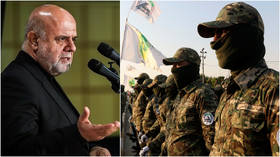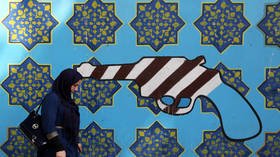US slaps sanctions on Iran’s envoy to Iraq, citing links to Quds Force & militia groups

Washington has added the Iranian ambassador to Iraq to its sanctions blacklist, claiming he works for an elite military unit it has deemed a terrorist cell, as well as three groups it accused of “sowing discord” in the 2020 race.
Sanctions were announced for Ambassador Iraj Masjedi on Thursday, with the US Treasury Department deeming him a “long-running threat to Iraqi security” and citing his alleged role in training militia groups in Iraq with Iran’s Revolutionary Guard Corps (IRGC) – designated a terrorist organization by the US last year.
“In his decades of service with the group, Masjedi has overseen a program of training and support to Iraqi militia groups, and he has directed or supported groups that are responsible for attacks that have killed and wounded US and coalition forces in Iraq,” the department said in a statement, adding that the envoy “has exploited his position as the Iranian regime’s ambassador in Iraq to obfuscate financial transfers conducted for the benefit” of the IRGC and its external wing, the Quds Force.
Also on rt.com Iran sent fake ‘Proud Boys’ emails to intimidate American voters & ‘damage President Trump,’ US spy chief and FBI director claimMasjedi was appointed ambassador in 2017, after serving in the IRGC for some 35 years. A veteran of the Iran-Iraq war, he later worked as a close adviser to Quds Force commander Qassem Soleimani, who was killed in a US assassination strike in January. Following Soleimani’s death, Masjedi took on some of his former duties in overseeing Iraq’s Shia militia groups – known as the Popular Mobilization Forces – which have played a salient role in beating back the Islamic State.
Though President Donald Trump has unleashed a barrage of sanctions on the Islamic Republic since taking office, including on Iranian leader Ayatollah Ali Khamenei and Foreign Minister Mohammad Javad Zarif, penalties for diplomats are somewhat rare, more often targeting military officials.
In Thursday’s sanctions announcement, Treasury Secretary Steve Mnuchin also accused Tehran of a “destabilizing foreign agenda,” including attempts to “influence US elections,” beating the drum on an increasingly common talking point from the Trump administration.
In the same spirit, on Thursday Washington also imposed penalties on five Iranian entities it said had tried to “influence elections in the United States,” though it produced no evidence to support the charge. One day prior, US intelligence officials also claimed Iran was behind a “spoof email” campaign designed to “intimidate voters, incite social unrest, and damage President Trump,” adding to a flurry of similar assertions of foreign influence operations by not only Iran, but Russia and China as well.
Tehran has rejected the allegations, lodging a formal complaint on Thursday with the Swiss ambassador in Iran – who has acted as a mediator for US-Iranian diplomacy – to protest charges it called “baseless.” A spokesman for Iran’s mission to the UN, Alireza Miryousefi, has also dismissed the claims as “absurd” and “dangerous,” scorching Washington for “desperate public attempts to question the outcome of its own elections.”
Assertions of foreign election-meddling have come to dominate the US political scene since the 2016 presidential race, originating with an elaborate conspiracy theory that then-candidate Trump worked with Moscow to tip the scales in his favor through a combination of hacking and social media trolls. Though the Trump-Russia narrative has been largely discredited after a sweeping special counsel probe failed to substantiate its central tenets, claims of election interference from abroad have only intensified since and continue to overshadow the 2020 race.
Also on rt.com ‘Nothing to do with reality’: Embassy rejects new US claims of Russia’s cyber ops, says they aimed at fomenting RussophobiaThink your friends would be interested? Share this story!















